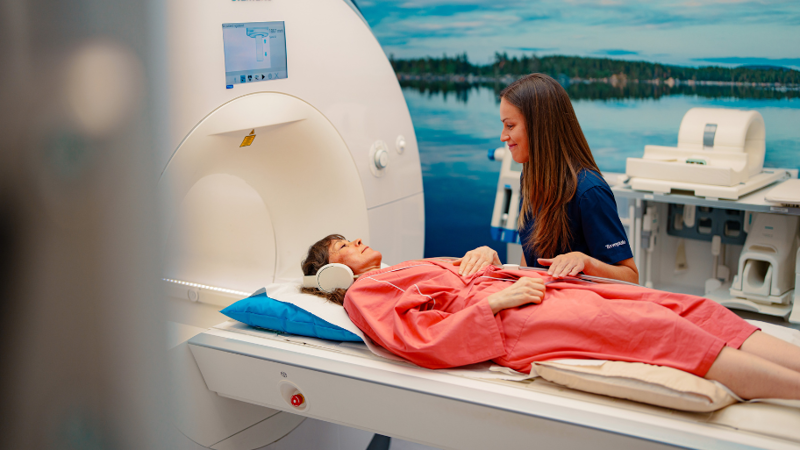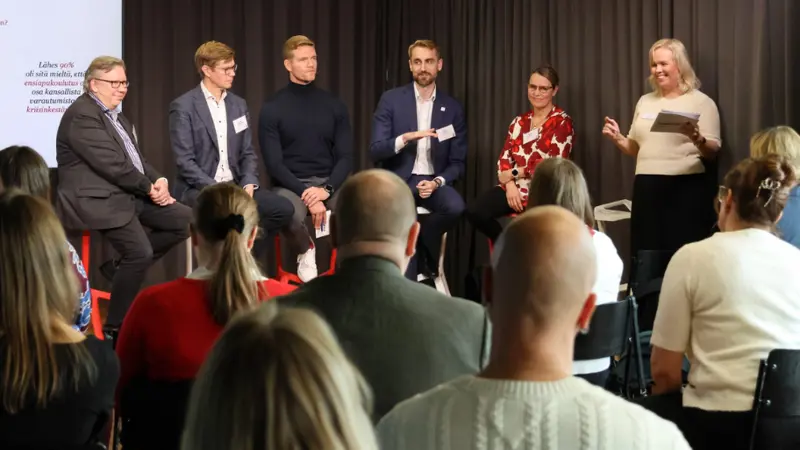Healthy working life barometer: 47% think Finnish working life is healthy - CEOs have a rosier view of the state of working life than HR managers and supervisors
Terveystalo's annual Healthy Working Life Barometer surveyed the state of Finnish working life, the ability of organisations to respond to changing working life and the role of occupational health in working life.

The Barometer's responses reveal that efficiency and productivity are still at the heart of Finnish working life. As many as 81% of respondents believe that working life is becoming more fast-paced and stressful. In particular, the Barometer highlights a clear difference of opinion between CEOs and HR managers and supervisors in their ability to take into account the cognitive load associated with job descriptions or tasks. As many as 74% of CEOs consider their organisation's ability to cope with stress to be good, compared to just over 50% of PMs and HR managers.
– However, while management has a clear vision and good will to put human factors above efficiency, this is not yet necessarily reflected sufficiently in day-to-day work, organisational processes and structures. The difference in perception is also influenced by the fact that line managers have a more concrete picture of the situation and pressures in their own units than senior managers. However, the attention paid to human factors has increased by 6 percentage points since the previous survey, which indicates a change towards a more balanced working life. In the long run, humanity will take over from efficiency, as long as this development is supported," says Outi Ikonen, senior organisational psychologist at Terveystalo.
Opportunities in continuous learning
Riia Astola-Pöllänen, Senior Work Capability Coach at Terveystalo, believes that a good work-life discourse overall needs to be freed up, because the general debate seems to emphasise workload too much already and we forget the opportunities offered by increasing skills. Although senior management and supervisors have different views on the healthiness of working life, all groups stress that continuous learning and skills maintenance, as well as digitalisation, offer the greatest opportunities.
– Fear of not knowing and learning new things can be seen as a health challenge, especially if there are other simultaneous stressors in life. However, skills challenges are usually very surmountable, as long as they are tackled early. People have a lot of knowledge and ability, but their confidence in their own learning can be low and their ability to see solutions impaired. By working together to articulate skills and thinking about the additional training needed, for example, solutions can usually be found. In the best case, the feeling of incompetence can be transformed from a burden to an enthusiasm for learning.
Competition for talent is the biggest challenge in working life
The barometer shows that the shortage of professionals and competition for talent is perceived by all respondent groups as a major challenge for the future of working life. According to the responses, responding to labour shortages has therefore increased the ability of organisations to take account of individual differences in performance and working ability. Although senior managers are also more confident about this issue, around half of HR managers and supervisors agree to some or all extent that their organisation has the capacity to take into account the needs and expectations of different age groups in terms of management.
– It is good to see that organisations have both the support of senior management and the confidence that operational level policies provide at an individual level to take account of both physical and cognitive work and functional capacity and to adapt work accordingly. When supervisors have sufficient competence in work capacity management, they can more boldly seek solutions to find meaningful work in situations where work capacity is partially or temporarily reduced," says Silja Komulainen, deputy senior physician in occupational health at Terveystalo.
CEOs' and entrepreneurs' confidence in their ability to influence the business world on the decline
A worrying phenomenon is that respondents feel that their ability to influence Finnish working life is significantly weaker than a year earlier. Compared to the 2023 results, there is a significant drop especially among CEOs (-8 percentage points) and entrepreneurs (-13 percentage points). This change can be explained by the chaotic business environment and economic uncertainty.
– In particular, CEOs and entrepreneurs have recently had to repeatedly come up with solutions in the face of constant change and crisis. Understandably, this can lead to a loss of experience of their own empowerment in the wider context. On the other hand, the development of working life takes place not only at the societal level, but also in every workplace and every unit. All staff should feel that they can have a say in improving working conditions," says Ikonen.
In order to work smarter and in a humanly sustainable way, there must be time for work development. Line managers have an important role to play here, but how time and resources are allocated to work development is also a strategic choice.
– The ability to enable continuous learning at work has seen a welcome and significant increase, up to 7 percentage points according to frontline staff. This shows that taking care of one's own labour market value is not just a night's work and the responsibility of the individual," says Ikonen.
* The Healthy Working Life Barometer was conducted as an online panel on 01-02/2024 with 921 respondents, representing a broad range of decision-makers in the roles of supervisors, HR managers, CEOs and entrepreneurs.
Read more occupational health articles

Terveystalo's digital services have been awarded the internationally recognized ISO27001 information security certification.
Terveystalo's information security practices, processes, and risk management are in line with international best practices.

Does massage help relieve stress? – Touch restores and calms the body and mind
Stress is not always visible on the outside, but the body does show signs when the strain increases. According to Lassi Ylönen, a trained massage therapist at Terveystalo Rela, the body often communicates stress through subtle signs.

Circular economy and artificial intelligence boost performance and improve care
At the heart of sustainable healthcare, technology serves as a tool for improving both the quality of care and accountability. Terveystalo favors solutions that combine sustainability, cost-effectiveness, and medical expertise.

Psychologist: How to make Christmas a relaxed and personal celebration
For many, the anticipation of Christmas begins when cities are decked out in seasonal lights and the first chocolates, calendars, and gingerbread cookies appear on store shelves. Christmas carols ring out and the Tonttuparaati choir sings “Kiire jo on! Kiire jo on!” (Hurry up! Hurry up!). This warm and atmospheric celebration also brings other feelings to mind: how on earth can we get through all this without losing our joy and peace in the rush?

Terveystalo and Gosta Labs deepen their cooperation: the goal is to streamline work with a superior patient information system
Terveystalo is deepening its cooperation with Finnish health technology company Gosta Labs and investing €1 million in the company as a minority investor. The aim is to jointly develop artificial intelligence solutions that improve the quality of care and the efficiency of reception work as part of Terveystalo's new patient information system, Terveystalo Ella.

First aid preparedness in companies requires action and courage
First aid skills increase resilience, but a barometer survey of Finnish organizations' first aid capabilities published in October reveals that the number of trained personnel is alarmingly low.